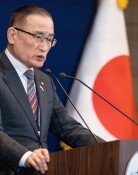Using Lifestyle Medicine to Ward Off Depression
Using Lifestyle Medicine to Ward Off Depression
Posted February. 13, 2008 07:37,

Lifestyle medicine, the new trend in medicine that focuses on prevention rather than cures, is attracting a growing number of people who, on the surface, look healthy. They receive special treatments not in a small-sized clinic but in a general hospital specializing in serious illnesses such as cancer and cardiovascular diseases.
The Lifestyle Center at Kangnam St. Marys Hospital is taking the lead in lifestyle medicine in Korea. When the clinic opened two years ago, nobody paid attention to it because the name of the clinic was hardly associated with diseases. But now, the center deals with an increasing number of patients who believe prevention is the best investment to maintain health.
○ Three-pronged treatment focuses on mind and body, nutrition and fitness
The clinics main clients are those who are highly likely to develop diseases. Though they are not currently diagnosed with any yet, they are vulnerable to serious illnesses. Most of them are obese and have high levels of cholesterol and blood sugar. Those who suffer from chronic fatigue and stress also come to the clinic.
Touting highly-advanced customized treatment, the center combines modern medicine with alternative medicine such as meditation and herbal diet to benefit from their synergistic effects.
When patients visit the clinic, they first consult with doctors in the integrated medical clinic at the medical center. Then they go through various assessments including blood and urine tests and checks for stress level, physical strength and nutrition. Taking all these test results into consideration, doctors write out prescriptions which are divided into three programs: meditation (Mind and Body Fitness), nourishment (Diet/Nutrition Fitness) and exercise (Physical Fitness). Based on a patients health, he or she can take one program or all three programs.
In the meditation program, physicians as well as psychologists are involved. With the help of the Neuro-Feedback Program, a state-of-the-art brain wave training system, patients relive stress, chronic fatigue, headache, fear and depression.
For those who participate in the Diet/Nutrition Fitness program, the center provides hands-on training in which patients cook their own meals to fit their health condition.
In the Physical Fitness program, physicians and health trainers introduce patients to customized exercise programs that match their physical strength and body type.
○ Developing unique and effective methods
The center also provides solutions to patients who have solely relied on medicine but have failed to see improvements.
A patient in his late-fifties, diagnosed with liver cancer, was in despair. While going through chemotherapy and regular check-ups, he also suffered from depression because he thought there was no choice but to wait for death.
However, he was introduced to the center and took part in its meditation program. The program stabilized his mind and gave him the determination to overcome his disease.
A patient with rheumatism in his early-forties was also taking prescription drugs. But there were no signs of improvement. Rather, his symptoms got worse and, in the end, he was unable to walk.
However, after participating in the Diet/Nutrition and Physical Fitness programs, he felt less pain and had enough strength to flex his legs with ease. Confidence has been restored and his life is now full of vigor.
○ But the price is high
Unfortunately, this new type of treatment is not covered under health insurance. The center charges patients, who use the clinic once a week for three months, 800,000 won for meditation, 900,000 won for nutrition, and 700,000 for exercise. Receiving training methods even without access to the facilities costs 400,000 to 500,000 won.
Another downside is that medical check-ups and the programs are carried out in separate locations. The Lifestyle Center is located three kilometers away from the integrated medicine clinic.
Recognizing the inconvenience to patients, Kim Gyeong-soo, family medicine professor and deputy director of the center, said, When Kangnam St. Marys Hospital extends its facilities and is renamed Seoul St. Marys Hospital in May 2009, the center will move into the hospital. For further information, call 02-590-4984.
corekim@donga.com






![[사설]참 구차한 김병기 전 원내대표](https://dimg.donga.com/c/138/175/90/1/wps/NEWS/IMAGE/2026/01/13/133151454.1.jpg)
